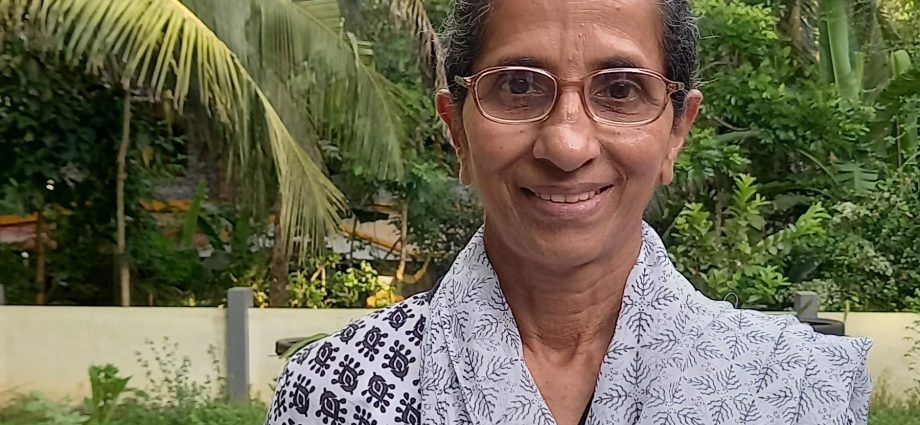By AXJ Bosco
The book, Following an Inner Voice: Life of an Activist Nun, the autobiography of Holy Cross Sister Manju Kulapuram, deals with life concerns of the disciples of Jesus, especially of the Religious.
Sister Manju expresses her search for a meaningful life and apostolate which many religious do not dare to go through.
The book shows the journey of her life from a dreaming little missionary to a vibrant and activist nun, relevant and meaningful for our times. Listening to ‘an Inner Voice’ shows her freedom, spontaneity and commitment in following Jesus, her Leader, Friend and Master, totally willing and ready to go wherever he led her whatever be the risks and difficulties.
The first sentence of the Introduction- ‘I write my story to make known how God has led me throughout my life through my inner voice, and how I have sincerely tried to discern and follow God’s will,’ clearly not only articulates the purpose but gives us an insight into the content of the book.
The whole of the Introduction in which Sister Manju gives the summary of her life and the book, raises our eagerness and curiosity to journey with Sr. Manju into the deep and powerful experiences of her life. The book is an experiential exploration of the Inner Voice, Listening, Discerning and Following God’s will.
The author explains her early life in the Valavoor village in Kerala’s Kottayam district, her writing on the sand with fingers to learn alphabets, praying hard that she should not become pregnant, impresses us with her simplicity. At the instance of the protest and burning of the bus, Sister Manju expresses her determination that she felt, even at that time to stand for justice.
Misunderstanding with her father which turned into a blessing to lead her to the Holy Cross Congregation gave her insight into discernment. The concept of awareness from Jesuit preacher Father Tony D’Mello’s seminar and motivation for social action from Father John Desrochers seminar made her feel ready to awaken the giant within.
Many religious go through the tension of institutional and non-institutional apostolates; Sister Manju felt constrained in the institutions; she wanted to go out to the poor and the marginalized and be like Jesus eating and drinking with the sinners, outcasts, Samaritans, prostitutes and the excluded. In this regard, she expressed her tensions, desires, discernment and proposals in her letter to Sister Joseline, the provincial.
Sister Manju expresses in detail her aggressive, bold and innovative apostolic adventures which make us admire her commitment and courage; further it motivates us to look into the social concerns and our duty to serve the millions of poor in our country.
She speaks of her experiences with Musahars in Jamsauth village in Bihar, who had a very low self-image, considering themselves children of the devil. Only unconditional love can liberate them. She was so one with the people that she had to go through the humiliating experience of having toilet in the open. She got a deep insight into incarnational spirituality.
While working with Santhals for ten years, with Brother C M Joseph’s team, she was able to see with her own eyes that likeminded people, working together with commitment can bring lasting change in society. She had a totally different of experience working with the Muslim community in Uttar Pradesh. Sometimes she had to face her own issues of loneliness, frustration and uncertainties; sometimes she had to face accusations of alleged conversion; sometimes, she felt helpless facing the issues of injustice like manual scavenging.
God prepared her through various exposures and lived in experiences, to take up a great responsibility of being the full time Executive Secretary of Forum of Religious for Justice and Peace which is the prophetic voice of the Church, dealing with problems and issues at the national level.
Getting involved in issues such as Kandhamal violence, Narakkal issue, Sister Valsa John’s murder, the strange case of Sister Anupama, the disgusting issue of Bishop Franco Mulakkal and the Farmers Protest widened her approach to people and issues, deepened her spirituality and broadened her understanding of the sinful and at the same time grace-filled Church.
In the last but one chapter, Sister Manju shares her growth and evolution of her spirituality. She found her own way of praying, her own way of loving Jesus and the poor and of thinking, feeling and living like Jesus. Hers is incarnational spirituality of emptying herself and surrendering herself in unconditional love to God; it was deepened when she saw a poor Musahar child lying in a basket, basking in the sunlight and when she had to keep company with a couple of buffaloes in her room when she lived with Muslims.
The last chapter concludes with glorious feedback from her friends and companions who genuinely appreciated and admired her, being grateful to God for giving her as a simple, yet fabulous gift to humanity. This book must be read not only by religious but by every Christian leader who wants to serve the pluralistic and inter-religious people of our country.
(Father AXJ Bosco is a former head of the Andhra Jesuit province and a member of the Forum of Religious for Justice and Peace.)

